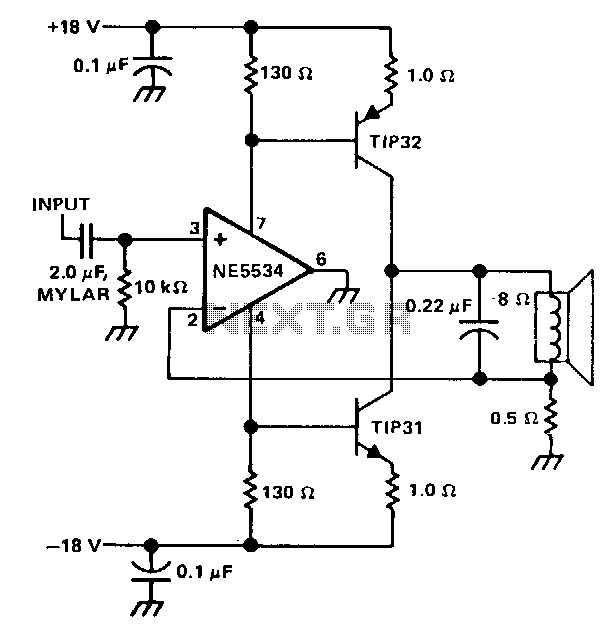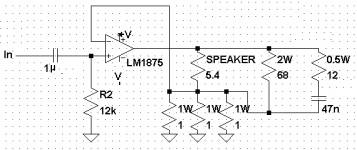I never much liked this topology:

output transistors driven by Op Amp rail current, because it depends on somewhat uncontrolled parameters and adds undefined voltage gain within the loop, a lot of voltage gain .
Combine that with heavy feedback and results are unpredictable.
I prefer to have more control of results.
If we want current feedback/transconductance amplifier to suit no crossovers involved full range speakers, fine, but let´s do it in a more controlled or predictable way.
Personally prefer to take a known working circuit, and apply the proper NFB network to it.
Pawel´s suggestion is as good as any and will bring no problems:
output transistors driven by Op Amp rail current, because it depends on somewhat uncontrolled parameters and adds undefined voltage gain within the loop, a lot of voltage gain .
Combine that with heavy feedback and results are unpredictable.
I prefer to have more control of results.
If we want current feedback/transconductance amplifier to suit no crossovers involved full range speakers, fine, but let´s do it in a more controlled or predictable way.
Personally prefer to take a known working circuit, and apply the proper NFB network to it.
Pawel´s suggestion is as good as any and will bring no problems:
Attachments
An externally hosted image should be here but it was not working when we last tested it.
I have difficulties with the English language. I do not need to decrease the quiescent current: I need to lower the opamp supply voltage. In post # 1, NE5534 can connect with 20VDC but other opamps as NE5532 it can only 15 VDC. I need less tension but I don't have technical knowledge of how to do it.
Усилитель <<Stonecold>> 200 Вт/4 Ом | ldsound.ru
Last edited:
Thank you very much for your help and effort. I have tried several voltage amps, transformed into current amps. I have no doubt, in my active crossover system, that the result is more vivid music, with many details, even in mp3 format! I remember Mr. John Burnett's excellent considerations (Amplifiers: Solid State amps verses Valve amps) and also the arguments of engineer Esa Meriläinen, in his book "Current-Driving of Loudspeakers". This helped us a lot. As for qualifying as "oddballs" those who like experiments with analog electronics applied to audio, more like that owner of a 300hp Ford gasoline, complaining about his neighbor, for having purchased a Model Y electric car from mr. Elon Musk ...
